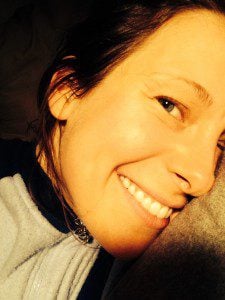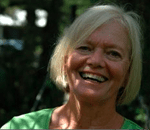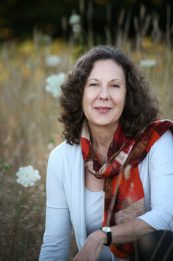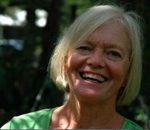 For the last two years I have sung in a gospel choir that has changed my life. A chorister since I was seven, I have ever prided myself on my technique and my discipline. So it is that I found my first few months with this choir challenging. I didn’t understand why our conductor wasn’t stricter, why he didn’t correct our rhythms more, why he didn’t direct the dynamics of every phrase. “When was he going to kick us into shape?” I wondered. We needed a little bit of the hard stick.
For the last two years I have sung in a gospel choir that has changed my life. A chorister since I was seven, I have ever prided myself on my technique and my discipline. So it is that I found my first few months with this choir challenging. I didn’t understand why our conductor wasn’t stricter, why he didn’t correct our rhythms more, why he didn’t direct the dynamics of every phrase. “When was he going to kick us into shape?” I wondered. We needed a little bit of the hard stick.
This is a small example of how I have lived the last thirty years. In my haste to be “the best” and “get things done”, I forgot to ask what the point of life was. It never occurred to me that our Thursday night rehearsals were for growing together as a family and for praising the beauty of life that flows through us all. I didn’t realise that we were there for a different purpose – weaving bonds between us, soothing each others’ souls, holding each others’ dreams, crying on each others’ shoulders – I didn’t realise we were doing Mother-Work.
Ayeja sings in the choir too. The first time I met Ayeja, she was crying. We didn’t speak much for the first few months, but I knew her as the woman who cried every time we sang something beautiful, which was often. This was also challenging for me. Where I grew up, people don’t cry lightly. Tears are considered a weakness, and are avoided at all costs. When Brits do cry, people rub their back and say: “There there dear”. It is assumed that something must be out of the ordinary, that we must try to make it stop.
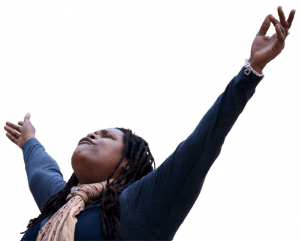
Ayeja taught me different. Ayeja’s cries come from deep within her soft, beautiful body. They are the sounds of her soul. Though she calls herself a “cry baby”, now that I know her, I see something different. I see the Mother; I see Goddess. I see the strength that is in looking at the truth and not turning away, that is in feeling the feelings and not running, that is in knowing the darkness of the world and being a willing vessel for the light. I see the tears of a spiritual warrior. I see her holding herself in her sorrow and her joy, whispering to herself that it’s okay to cry, having compassion for herself – I see her doing that Mother-Work for herself.
Ayeja was brought up Baptist but now follows her own path. “Love is everything”, she says in her low, Southern drawl. The challenges of living in the most expensive city in the world have given this woman many good reasons to cry; yet there is something in me that knows her tears are not those of self-pity. “New York humbled me”, she says. “I’m backed into a corner. I’m in a place where I have to have faith.”
Faith is something that Ayeja gives me in spades. She operates on the assumption that she is just one piece of a living organism, the organism that is the holy human family. And so she has done her Mother-Work with me too – wiping away my tears on several occasions, and whispering in my ear “I’ll pray for you baby”, with such conviction and compassion that I am convinced she actually did. This is not the empty promise of “a good Christian”, but the sacred pledge of a woman who knows that my welfare and her own are one. I’ve never met anyone who so fully embodies the scriptures.
When Ayeja sings it makes the hairs on the back of my neck stand up. She is always modest, reminding us that she never got trained, and fretting that she “doesn’t even read music”. But as someone who had the spirit trained right out of her, I look at Ayeja and I see the freedom I never had, the freedom I am still reaching for. I hear the voice of a natural, honest-to-God angel. She isn’t looking for praise or success or for the glory of being listened to. She’s just got the spirit and she wants to let you know it. She wants you to feel it too. That’s Mother-Work too.
When Ayeja sings Goddess weeps, because she knows that the dawn is coming. Ayeja’s voice is part of the Divine Feminine sound of the Mother that is echoing across the world at this time; reconnecting us all to what it means to be alive. You can’t listen to Ayeja and think about your schedule or where you left your keys; all you can do is feel the glory of what it means to be real, to be whole, to be a spiritual being in a beautiful human body. Her deep vibrations stir something in you that has no name, which you can only experience in the moment, can only touch when you’re in acceptance. Ayeja helps me to find the Mother-Sister-Daughter in me; her love helps me to do my Mother-Work too.
Dedicated to all those women and men who do Mother-Work too.
Laura Paskell-Brown is a writer, story-teller and a gatherer of women. She is also studying for a PhD in Developmental Psychology. She lives in Brooklyn.
Ayeja Feamster is an actress and singer. She lives in New York.






